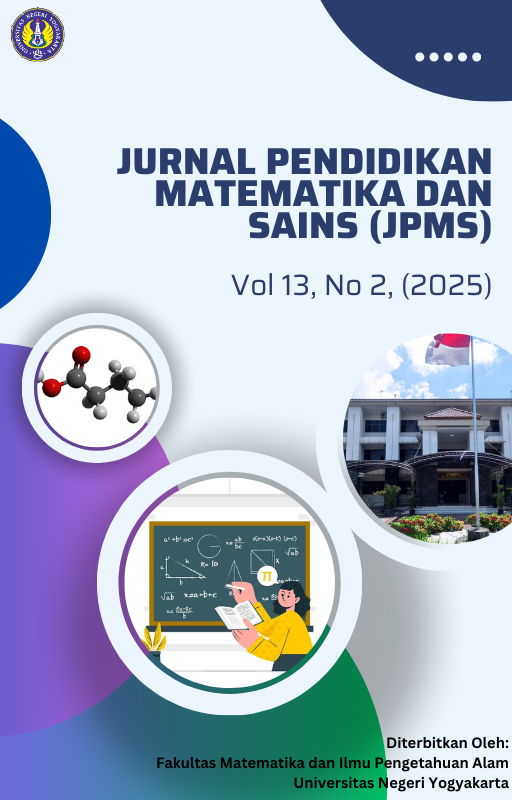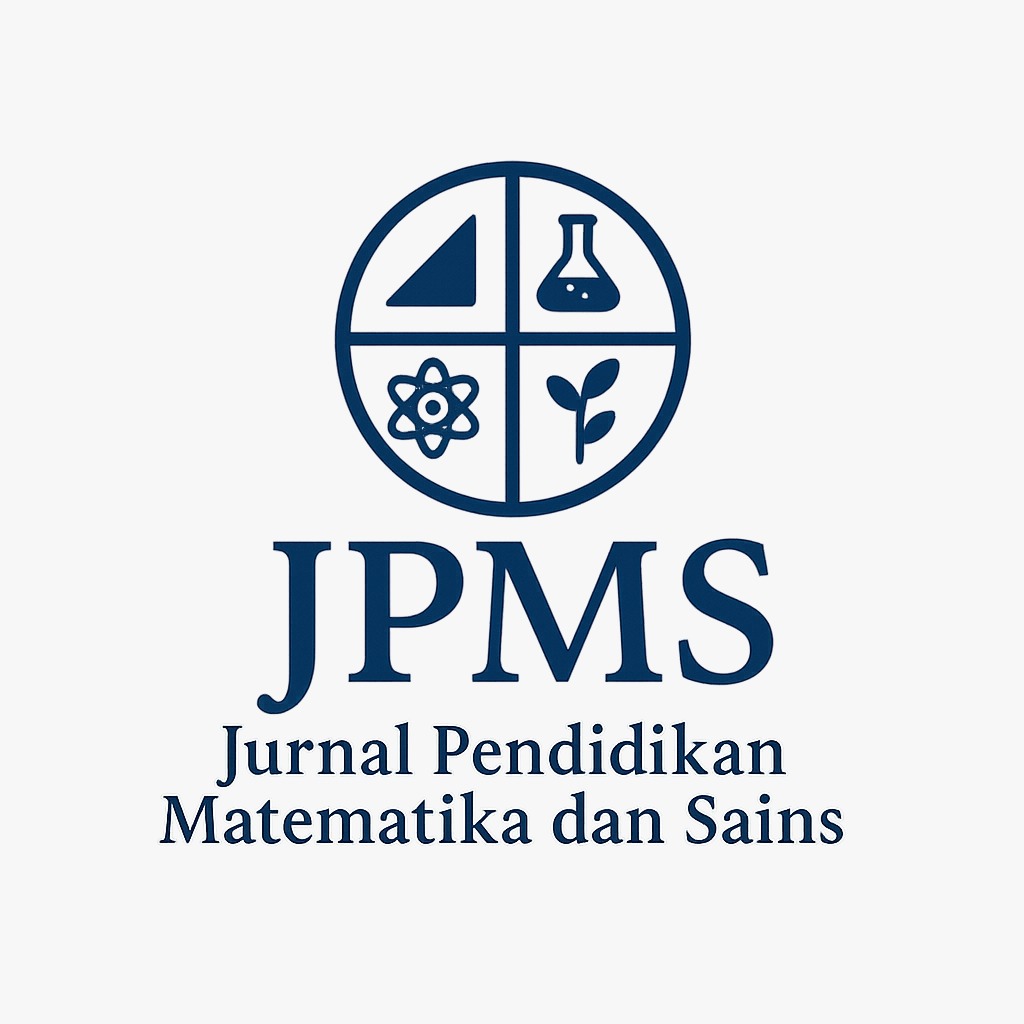Investigating the Interplay of Social and Biological Factors on Mathematics Anxiety among Senior Secondary Students
DOI:
https://doi.org/10.21831/jpms.v13i2.84085Keywords:
Mathematics Anxiety, Family pressure, Environment, Learner's behaviour, Genetic predispositionAbstract
This study investigates the social and biological factors influencing mathematics anxiety among senior secondary school students in Sagamu Local Government Area, Ogun State, Nigeria. Data were gathered using a descriptive survey methodology, 500 students across five secondary schools using simple random sampling techniques. A standardized questionnaires Social Factor Questionnaire (SFQ, r=0.82), Biological Factors Questionnaire (BFQ, r=0.73) and Abbreviated Math Anxiety Scale (AMAS, r=0.84). Descriptive statistics (mean and standard deviation) and Pearson correlation analysis were used to analyze the data. Results reveal that family pressure, inappropriate teaching methods, the school environment, neurological responses to stress, and age and developmental stage are significantly related to mathematics anxiety among senior secondary school students. Conversely, learners' behaviour, genetic predispositions, and gender do not significantly affect mathematics anxiety. Therefore, the study recommends that schools s implement parent-teacher programs and counselling service to reduce family pressure and foster a supportive home environment for students.
References
Abubakar, I., & Afe Buame, E. (2011). The importance of mathematics in societal transformation. Journal of Education and Practice, 2(2), 12-16.
Adekunle, R. A. (2024). Social and Biological Factors as Determinant of Senior Secondary Students Anxiety in Mathematics, Tai Solarin University of Education, Nigeria.
Ahmed, W., Minnaert, A., Kuyper, H., & van der Werf, G. (2012). Reciprocal relationships between math self-concept and math anxiety. Learning and Individual Differences, 22(3), 385-389.
Arslan, B. (2020). Mathematics anxiety and its correlation with test anxiety among university students. Educational Studies, 46(1), 47-64.
Asanre, A. A., Abiodun, T. O., Olaniyan, J .S., Olusola, G. S. & Ogunmokun, T. M. “Predicting academic achievement using mathematics anxiety among senior secondary school students”. TASUED Journal of Pure and Applied Science, 2(1), 136-142. 2023 https://journals.tasued.edu.ng/index.php/tjopas/article/view/21
Asanre, A., & Abiodun, T. (2025). Effects of Laboratory Teaching Strategy on Academic Performance of Primary School Pupils in Mathematics. Journal of Educational Sciences, 9(1), 409-418. https://doi.org/10.31258/jes.9.1.p.409-418
Asanre, A.A., Ifamuyiwa, A. S., &Abiodun, T.O. (2024a). Dimensions of Students’ Academic Engagement as Predictors of Senior Secondary School Mathematics Achievement. Journal of Science and Mathematics Letters, 12(1), 27-33, https://doi.org/10.37134/jsml.vol12.1.4.2024
Asanre, A. A., Sondlo, A., & Oluwadayo, A. T (2024b). Effect of problem-based learning strategy on the learning outcomes of senior secondary school students in Mathematics. Journal of Advanced Sciences and Mathematics Education, 4(1), 15 - 23. https://journal.foundae.com/index.php/jasme/article/view/370
Ashcraft, M. H., & Krause, J. A. (2007). Working memory, math performance, and math anxiety. Psychonomic Bulletin & Review, 14(2), 243-248.
Ashcraft, M. H., and Moore, A. M. (2009). Mathematics anxiety and the affective drop in performance. J. Psychoeduc. Assess. 27, 197–205. doi: 10.1177/0734282908330580
Ashcraft, M. H., & Ridley, K. S. (2005). Mathematics anxiety and its effects on the mathematics performance of college students. Journal of Research in Mathematics Education, 36(3), 223-242.
Azizah, N., & Suhendra, E. (2020). Mathematics learning difficulties: A review. International Journal of Educational Research Review, 5(1), 99-106.
Bessant, K. C. (2019) Factors associated with types of math anxiety in college students. Journal for Research in Math Education, 26, 327–345
Barroso, C., Ganley, C. M., McGraw, A. L., Geer, E. A., Hart, S. A., & Daucourt, M. C. (2021). A meta-analysis of the relation between math anxiety and math achievement. Psychological Bulletin, 147(2), 134–168. https://doi.org/10.1037/bu10000307
Beilock, S. L., & Maloney, E. A. (2015). Math anxiety: A factor in the underrepresentation of women in mathematics? Psychological Science in the Public Interest, 16(1), 1-25.
Boaler, J. (2013). The mathematical mindset: How teachers can change the way students think about math. Educational Leadership, 70(8), 18-22.
Chang, H., & Beilock, S. L. (2016). The role of anxiety in mathematics achievement. Journal of Educational Psychology, 108(4), 510-526.
Chiu, L. H., & Henry, L. L. (1990). Development and validation of the mathematics anxiety scale for children. Measurement and Evaluation in Counseling and Development, 23(3), 121-127.
Dowker, A., Sarkar, A., and Looi, C. Y. (2016). Mathematics anxiety: what have we learned in 60 years? Front. Psychol. 7:508. doi: 10.3389/fpsyg.2016.00508
Dunin, S. (2021). The impact of math anxiety on student success in STEM courses. Journal of STEM Education Research, 10(1), 1-18.
Eccles, J. S., Wigfield, A., & Schiefele, U. (2013). Motivation to succeed. In W. Damon (Ed.), Handbook of child psychology (5th ed., Vol. 3, pp. 1017-1095). John Wiley & Sons, Inc.
Ersozlu, M., & Karakus, F. (2019). The genetic basis of mathematics anxiety: Evidence from twin studies. Anxiety, Stress, & Coping, 32(3), 271-282.
Eze, P. I. (2016). The effect of parental pressure on academic achievement of secondary school students in Nigeria. International Journal of Education and Research, 4(6), 45-56.
Else-Quest, N. M., Hyde, J. S., and Linn, M. C. (2010). Cross-national patterns of gender differences in mathematics: a meta-analysis. Psychol. Bull. 136, 103–127. doi: 10.1037/a0018053
Geary, D. C., Hoard, M. K., Nugent, L., Chu, F. W., Scofield, J. E., & Hibbard, D. F. (2019). Sex differences in mathematics anxiety and attitudes: Concurrent and longitudinal relations to mathematical competence. Journal of Educational Psychology. doi:10.1037/edu0000355
Green and Allerton (2019) An introduction to motivation. Princeton, NJ: Motivation for achievement. In T. Blass (Ed.), Personality variables in social behavior
Gunderson, E. A., Ramirez, G., Levine, S. C., & Beilock, S. L. (2012). The role of parents and teachers in the development of children’s math attitudes. Child Development, 83(3), 1360-1375.
Haase, V. G., Guimarães, A. P., & Wood, G. (2019). Mathematics anxiety: A multifaceted construct and its implications for assessment in school and clinical contexts. Psychology in the Schools, 56(8), 1307-1325.
Hembree, R. (1990). The nature, effects, and relief of mathematics anxiety. J. Res. Math. Educ. 21, 33–46. doi: 10.2307/749455
Hill, F., Mammarella, I. C., Devine, A., Caviola, S., Passolunghi, M. C., and Szucs, D. (2016). Maths anxiety in primary and secondary school students: Gender differences, developmental changes and anxiety specificity. Learn. Individ. Differ. 48, 45–53. doi: 10.1016/j.lindif.2016.02.006
Hopko, D. R., Mahadevan, R., Bare, R. L., & Hunt, M. K. (2003). The abbreviatedMath anxiety scale (AMAS): Construction, validity, and reliability. Assessment, 10(2),178-182. https://doi.org/10.1177/1073191103010002008.
Ifamuyiwa, A. S., Asanre, A. A., & Abiodun, T. O. (2024). Prediting Mathematics Students’ Learning Outcomes in Senior Secondary School using Dimensions of Academic Engagement. EDUCATUM Journal of Science, Mathematics and Technology, 11(1), 15–22. https://doi.org/10.37134/ejsmt.vol11.1.3.2024
Iroegbu, T. (2013). Effect of guided inquiry and demonstration on science process skills acquisition among secondary school students. Journal of Education and Practice, 4(15), 27-38.
Jatt, S. (2019). Understanding anxiety and its implications for learning. International Journal of Learning and Teaching, 5(1), 19-24.
Kavak, Y., & Coşkun, S. (2023). The influence of family expectations on student academic performance. Journal of Educational Psychology, 115(3), 502-518.
Kim, K. H., Park, H. J., & Lee, J. K. (2015). School environment and mathematics anxiety: Evidence from Korean secondary schools. Journal of School Psychology, 53(2), 125-140.
Koçoğlu, M., & Kaya, A. (2016). Environmental factors contributing to mathematics anxiety. Journal of Educational Sciences Research, 6(2), 133-142.
Kour, S. J., & Rafaqi, M. Z. U. H. (2024). Factors influencing mathematical anxiety among students: A social perspective. Journal of Mathematics Education Research, 41(1), 112-130.
Kucuk, S., Aydemir, M., Yildirim, G., Arpacik, O., & Goktas, Y. (2013). Educational technology research trendsin Turkey from 1990 to 2011. Computers & Education, 68, 42–50. http://doi.org/10.1016/j.compedu.2013.04.016
Kusmaryono, K., Gufron, A., & Rusdiantoro, W. (2020). Mathematics: A critical tool for problem-solving. Journal of Mathematics Education, 13(1), 1-12.
Lazarus, R. S., & Folkman, S. (1984). Stress, appraisal, and coping. Springer Publishing Company.
Luttenberger, S., Wimmer, S., & Paechter, M. (2018). Spotlight on math anxiety. Psychology Research and Behavior Management, 11, 311-322. https://doi.org/10.2147/PRBM.S141421
Maloney, E. A., & Beilock, S. L. (2012). Math anxiety affects younger and older adults: Evidence from an fMRI study. Cognitive, Affective, & Behavioral Neuroscience, 12(4), 740-754.
Maloney, E. A., Sattizahn, J. R., and Beilock, S. L. (2014). Anxiety and cognition. Wiley Interdiscipl. Rev. Cogn. Sci. 5, 403–411. Doi: 10.1002/wcs.1299
Maloney, E. A., Ramirez, G., Gunderson, E. A., Levine, S. C., and Beilock, S. L. (2015). Intergenerational effects of parents' math anxiety on children's math achievement and anxiety. Psychol. Sci. 26, 1480–1488. doi: 10.1177/0956797615592630
Mann, J., & Walshaw, M. (2019). Assessment anxiety and its impact on mathematics learning. International Journal of Research in Education and Science, 5(2), 345-356.
Marks, D. (2022). The influence of social and parental factors on mathematics anxiety. Journal of Educational Psychology, 55(3), 289-301
McDonough, I. M., & Ramirez, G. (2018). Mathematics anxiety and its effects on students’ learning processes. Journal of Educational Psychology, 110(6), 790-804.
Meece, J. L., Wigfield, A., & Eccles, J. S. (2006). Predictors of math anxiety and its consequences. Educational Psychology Review, 18(4), 279-307.
Mutlu, A. (2019). The effects of mathematics anxiety on academic performance in mathematics. Journal of Mathematical Behaviour, 55, 67-77.
Namkung, J., Bowers, A. A., & Bickel, B. (2019). The relationship between mathematics anxiety and academic performance. Journal of Learning and Development in Education, 5(1), 30-41.
National Council of Teachers of Mathematics, (2020) standards for mathematics teacher preparation. Retrieved from https://www.nctm.org/standards-and-positions/CAEP-Standard/.
Obodo, G. C. (2010). Factors affecting mathematics performance among secondary school students in Nigeria. Journal of Educational and Social Research, 2(1), 121-128.
Odiri, E. O. (2023). Peer interactions, teacher-student relationships, and parental expectations as predictors of math anxiety. International Journal of Mathematics Education, 37(4), 456-468.
Onoshakpokaiye, E. O. (2021). The Learning skills: an educational implication on students’ performance in secondary school mathematics. Mathematics Education Journal. 5(2), 115-123.https://ejournal.umm.ac.id/index.php/MEJ/article/view/16338/9744
PISA (2012). Programme for International Student Assessment. OECD Publishing.
Pramana, H., Kusuma, D., & Riyanto, A. (2020). Cognitive and environmental factors influencing math anxiety in junior high school students in Yogyakarta. Indonesian Journal of Educational Research, 24(1), 98-110.
Ramirez, G., Chang, B., & Maloney, E. A. (2018). Mathematics anxiety and its impact on academic performance: A meta-analysis. Educational Psychologist, 53(3), 176-191.
Ramirez, G., Chang, H., Maloney, E. A., Levine, S. C., & Beilock, S. L. (2016). On the relationship between math anxiety and math achievement in early elementary school: the role of problem solving strategies. J. Exp. Child Psychol. 141, 83–100. doi: 10.1016/j.jecp.2015.07.014
Ryan, A. M. (2001). The influence of peers on children’s academic achievement. In Peer Relationships and Academic Achievement (pp. 13-32). Routledge.
Roohi, F. (2012). Role of Mathematics in the Development of Society. National Meet on Celebration of National Year of Mathematics-2012; organized by NCERT, New Delhi
Sheffield and Hunt (2017) A comparison of math anxiety and Statistics anxiety in relation to general anxiety, Eric Document Reproduction. Service No. 436703.
Siswanti, S., & Djalal, A. (2018). Students’ profiles of math anxiety: A case study. Journal of Mathematics Education, 11(2), 123-134.
Spencer, S. J., Steele, C. M., & Quinn, D. M. (2019). Stereotype threat and women’s math performance. Journal of Experimental Social Psychology, 35(1), 4-28.
Stein, M. B., Jang, K. L., & Livesley, W. J. (2017). Heritability of anxiety sensitivity: A twin study. American Journal of Psychiatry, 156(2), 246-251.
Suárez-Pellicioni, M., Núñez-Peña, M. I., & Colomé, À. (2016). Math anxiety: A review of its cognitive consequences, psychophysiological correlates, and brain bases. Cognitive, Affective, & Behavioral Neuroscience, 16(1), 3-22.
Suren, H., & Kandemir, M. (2020). Motivation and its impact on mathematics anxiety. Eurasia Journal of Mathematics, Science and Technology Education, 16(1), 18-28.
Vargas, J. (2021). Genetic predispositions and psychological factors contributing to mathematics anxiety. Review of Psychological Studies, 28(2), 85-98.
Vazquez, M. M. (2016). Parental involvement and academic performance in middle school. Journal of Educational Research and Practice, 6(1), 23-32.
Wang, Y., Liu, X., & Simpkins, S. D. (2018). Classroom-based interventions for reducing mathematics anxiety: A meta-analysis. Educational Research Review, 24, 39-50.
Wang, Z., Hart, S. A., Kovas, Y., Lukowski, S., Soden, B., Thompson, L. A., & Petrill, S. A. (2014). Who is afraid of math? Two sources of genetic variance for mathematical anxiety. Journal of Child Psychology and Psychiatry, 55(9), 1056-1064.
Yahya, R., & Amir, Z. (2018). Challenges in mathematics education: Students’ perspectives. Educational Studies in Mathematics, 98(3), 251-266.
Young, C. B., Wu, S. S., and Menon, V. (2012). The neurodevelopmental basis of math anxiety. Psychol. Sci. 23, 492–501. doi: 10.1177/0956797611429134
Zakaria, E., & Nordin, N. M. (2008). The effects of mathematics anxiety on matriculation students as related to motivation and achievement. Eurasia Journal of Mathematics, Science and Technology Education, 4(1), 27-30.
Zanabazar, A., Munkhbayar, T., & Baigal, A. (2023). Factors causing math anxiety among undergraduate students. Journal of Education and Learning, 12(3), 145-156.
Downloads
Published
How to Cite
Issue
Section
Citation Check
License
Copyright (c) 2025 Jurnal Pendidikan Matematika dan Sains

This work is licensed under a Creative Commons Attribution-ShareAlike 4.0 International License.
Jurnal Pendidikan Matematika dan Sains allows readers to read, download, copy, distribute, print, search, or link to its articles' full texts and allows readers to use them for any other lawful purpose. The journal allows the author(s) to hold the copyright without restrictions. Finally, the journal allows the author(s) to retain publishing rights without restrictions
- Authors are allowed to archive their submitted article in an open access repository
- Authors are allowed to archive the final published article in an open access repository with an acknowledgment of its initial publication in this journal

This work is licensed under a Creative Commons Attribution-ShareAlike 4.0 Generic License.





